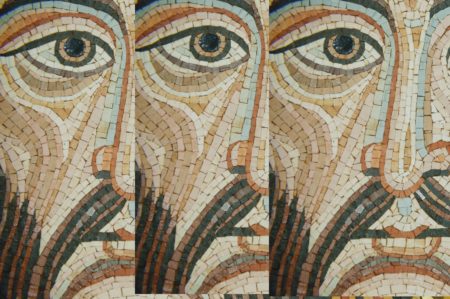He’s just out of answers on the Trinity. But does tritheist Steve Hays do better when it comes to laying out a plausible, Bible-fitting Incarnation theory?
1. In the person of the Son, God assumed a rational human soul and body. The Incarnation is a union between the timeless, incorporeal Son, a mind in time, and a body in space. A union between different individualized natures, analogous to Cartesian/substance dualism (although souls exist in time whereas the mind of the Son exists outside of time).
So, “God” here, I take it, means the Trinity. Somehow this thing, whatever it is, can act through one of its parts, the eternal, divine Logos. Using traditional catholic language, Hays says that this god “assumed” a “rational human soul and body” – what many catholic sources call “a complete human nature.” But then, strangely, he touts “the Incarnation” as a “union” (whatever this may mean) between this god “and a body in space.” Let’s go with this second thing he says here for the moment, that Incarnation is the Son god “assuming” a human body, resulting some sort of “union.”
 One may well ask what “assumption” means, and what sort of “union” he has in mind. But I fear that he’d do the squid getaway: squirt out a cloud of black mystery ink, and swim away as fast as he can. Let’s not poke the squid right now.
One may well ask what “assumption” means, and what sort of “union” he has in mind. But I fear that he’d do the squid getaway: squirt out a cloud of black mystery ink, and swim away as fast as he can. Let’s not poke the squid right now.
We’re talking about Jesus, right? A living, human being? So Hays’s view is that this god, the Logos, takes the place of a human soul in this instance; the living being, the man we call Jesus, is a god in a bod. As a normal human is a human soul in a human body, in this case the man Jesus is supposed to be a god in (or somehow united to) a human body.
Four obvious problems with all of this:
- What happened to the assumed “rational” (i.e. human) soul? That’s not needed, right? Hays combines two historical, but clashing views of what Incarnation involves. On the interpretation of Hays we’re working with now, he picks Athanasius over Origen. (More here.)
- We all think that a non-human spirit which happens to be controlling a human body is not, thereby, a real human being. (More here.) So why think that in this case, the result would be a real man?
- None of the things he’s said so far is clearly taught in scripture.
- The catholic traditions denounce this god in a bod view as “Apollinarian” heresy.
But tritheist Hays speculates on:
The relation [between the god which is the Son and the human body and soul] is asymmetrical. To paraphrase Aquinas, the Incarnation entailed no change in the Son, but only in the nature newly assumed into the preexistent Son. The eternal Son became Incarnate through union with a human soul and body. Now a union is a relation. And relations newly said of God with respect to creatures do not imply a change on God’s side, but on the creature’s side by relating in a new way to God.
Not clear why he wants the Son/Logos, which he just said was “a mind in time” to be changeless. Perhaps he thinks full deity entails timelessness, and so changelessness. This would be hard to square with the Son of the Bible, who is constantly changing.
In any case, we’re back to Origen now! Now this Son god “assumes” “a human soul and body.” The problem here, is that the dualist theory underlying this is that a human and soul are what constitute a living human person. Does Hays, like Origen (and arguably the 5th c. “fathers”) agree that in addition to the god person here (the eternal Son) there is also a human being, a man? If so, that is one too many Jesuses! If not, why not? He had an answer before – that the god assumes only a body. But he’s gone back on that. On the face of it, there are two selves here: the god and the man. But it’s about to get worse, as Hays appeals to the 5th c. and later idea of the composite Christ – yet another self!
2. The union produced a complex person. In a sense, Jesus has a human mind and a divine mind, but the relation is asymmetrical. The divine mind knows everything the human mind knows, while the human mind, in addition to its natural human understanding, only knows what the divine mind shares with it. The divine mind controls the human mind.
“Jesus” here means not the man (or the human nature) but rather that thing composed of the god, the soul, and the body – the godman. For all we can tell, Hays’s theory gives us a man, a god, and a godman which is composed of the first two. So, we’re up to three Jesuses. The man Jesus has the human soul, so a human mind. The other, the god, has a divine mind. The composite Jesus, then, has both, in virtue (somehow) of one one part which has each. But Hays assures us that the god here knows more than and is in control of the man.
3. Since human nature already has communicable divine attributes, divine and human natures are sufficiently compatible to make a divine Incarnation possible. Likewise, human minds originate in God’s concept of human minds, so the idea of human minds is already contained in the Godhead.
Worried that nothing could be both human and divine? No problem, Hays says. You see, divinity and humanity are compatible.
Feel better?
 This is ignoring a whole bustling herd of arguments. Some Christian philosophers’ heads may explode at this point.
This is ignoring a whole bustling herd of arguments. Some Christian philosophers’ heads may explode at this point.
Worse, Hays reasons poorly here, saying that because “human nature already has communicable divine attributes” – I think he means, the man here has whatever attributes the god can pass on to him – like maybe the inability to sin? – “divine and human natures are sufficiently compatible to make a divine Incarnation possible”. But this doesn’t follow. Just because some divine attributes can be given to a human, it doesn’t follow that they all are. What about essential omniscience? Essential omnipotence? Aseity? The essential inability to be tempted? Uncreatedness and eternity? Does the god-Jesus pass on the essential divine features of uncreatedness and existing at all times to the man-Jesus? This body and soul composite, after all, did not exist in 100 B.C.
All in all, a poor outing. He’s got the eternal god Jesus, the Logos that catholic traditions find in John 1, and he’s also got a composite godman Jesus. The former is supposed to be have always existed, while the latter came to be in the 1st century. In addition, there is a human body and soul, apparently the owner of a human mind, and so apparently, a man. No doubt, Hays thinks this is what died on the cross, so again, a man, not a property, and not merely an aggregate of soul and body.
 So that’s three Jesuses. He’s not only a tritheist, he’s also a tri-Jes-ist.
So that’s three Jesuses. He’s not only a tritheist, he’s also a tri-Jes-ist.
In the NT, “the Son of God,” “the Messiah,” and “Jesus,” “Lord Jesus Christ” (etc.) are co-referring terms, referring to that man which is Mary’s Son, and also, by a miracle, God’s “Son.” That is all to say, there is only one “Jesus” there. The composite Christ makes no appearance there, and arguably, neither does this other god (the Logos), a supposed god in addition to the Father. One will of course have to answer catholic traditions of reading John 1 and Philippians 2, but those are discussions for another time.
As to Hays, he obviously needs fewer selves in his christology. Various christologies do this in different ways, but his is a poorly developed theory. Even two is one too many.
If you are Christian seeking a proper understanding of the one Jesus, you’ll have to look elsewhere. This apologist is loyal to catholic traditions and knows what sorts of things he is supposed to say. But his Incarnation theory is a terrible mess.

June 27th. Happy Trinity Sunday!!! The Sunday after Pentecost in the Western Tradition. A Sunday for celebrating how irrelevant our traditions have become to the Bible. A Sunday for worshiping something we can’t define or understand but are obliged to speculate about. Steve Hays just another case in point. No matter how many trinitarians I talk to, they all have their own take. It’s reverent to speculate about The Trinity and irreverent to be a denier, so speculate away. Don’t deny it, just speculate it. After all, 3 points always lays on the same plane, so of course The Trinity has to be God. And besides, even humans are a Trinity! Body, soul, spirit! And besides that, water has three states it exists in – solid, liquid and gas. So there you go, it’s proven!! The average person is convinced so it must be true. And if you don’t think it’s true, well Einstein proved that everything’s relative anyway. Happy Trinities Sunday!
Comments are closed.